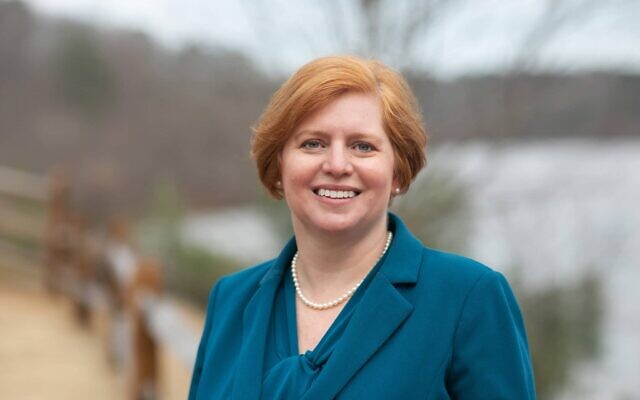Elder Abuse Attorney Stresses Planning
Weinberg shares important lessons on who to trust or who not to.
After 37 years with the Atlanta Journal-Constitution and now with the AJT, , Jaffe’s focus is lifestyle, art, dining, fashion, and community events with emphasis on Jewish movers and shakers.
The current pandemic has created a heightened awareness of the plight of seniors and their families when it comes to their legal and financial well-being, according to elder abuse attorney Diane Weinberg.
Hailing from Tennessee, Weinberg graduated from the University of Pennsylvania and Emory University School of Law. After running unsuccessfully for probate court judge of Fulton County, Weinberg recently opened her solo practice, Weinberg Elder Law, LLC. Her focus is on elder law advocacy and dispute resolution both inside and outside the courtroom. This requires a working knowledge of complex statutory structures including Social Security, Medicare, Medicaid, Supplemental Security Income, tax; trust, estates, and probate; guardianship, conservatorship; veterans’ benefits; and other public benefits.
“The primary abuse I see in the Jewish community (as others) is exploitation,” said Weinberg, a member of Congregation Beth Shalom. “Adult children simply don’t want to wait for their inheritance. They have parents with dementia sign a power of attorney, and that child immediately begins transferring assets into her name.
“An agent who uses the funds of an individual with disabilities or an elderly person for their benefit will face both civil liability and criminal penalties.”
Weinberg weighs in on current topics:
Pandemic
The pandemic posed special challenges for individuals in [senior care] facilities or who need to be. Because COVID ran through nursing homes, some were not checked on by family. Individuals with dementia suffer from the lack of human contact. Active individuals who need assistance with some activities of daily living are not able to get adequate physical and mental activity. Being in their apartments for months could causing muscular and intellectual atrophy. Facilities have been granted waivers of liability for negligence that may have occurred during the pandemic. We won’t know for several years the extent seniors suffered from this. I’m not sure what type of recourse will be available for families who have suffered injuries.
Politics
Neither political party has a good grasp on the complicated issues that arise with disability. Both understand that those who are elderly or disabled require a disproportionate amount of services. When the government wants to reduce spending, both parties inevitably propose legislation narrowing eligibility for benefits and subjecting attorneys to criminal liability for advising clients about their eligibility. With government spending at an all-time high, I fully expect that the next administration will take steps to decrease access to public benefits and to discourage attorneys from helping this vulnerable population.

Family issues
State law dictates who makes decisions on your behalf if you cannot speak for yourself and what will happen to your assets when you die. This means that your daughter may be asked to decide whether you should receive a medical treatment even though you have not spoken for years. It means that your long-time partner may be kept out of your hospital room because she has no authorization.
Failure to plan is especially brutal for a special needs child or for an adult who has an intellectual disability or mental illness. I have had special needs adults go missing, and no one wanted to file a missing person’s report. I have had adults walk into my office with no idea as to how to care for their disabled sibling. Mom and Dad simply assumed that the sibling would provide care without ever asking. In some cases, they loved their sibling but had no desire to assume responsibility.
I’ve seen parents pick children to serve as co-fiduciaries because the parents do not want to leave someone out. If your children don’t get along during your lifetime, they will continue to fight once you need their help. Ultimately, a court will be asked to determine who will act on your behalf.
I’ve advised adults who want to nominate a child as a fiduciary because the adult child will be angry if he’s not. This child is more interested in the ability to control you and her siblings than in providing care or following your wishes. Let this adult child be angry!
Don’t pick a fiduciary with money problems. Remember Wimpy from the Popeye cartoon, famous for his line of asking for money today so that he could pay you Tuesday? For a child with money problems, that could be a temptation, and he may borrow with the honest intent to repay it. That repayment never happens, and the dipping continues.
Selecting right
I can write an award-winning long-term care plan, but it will be worthless without the appropriate fiduciary who needs to be trustworthy and not under the influence of drugs or alcohol, a gambling addiction, or a spouse who likes nice things.
Picking co-fiduciaries is generally a bad idea. Financial institutions increasingly refuse to honor co-fiduciary selections.
The best way to protect your future and the future of your family is to create a plan. Look honestly at your children, friends and relatives, and decide who is best equipped to carry out your goals. Hire a good attorney to implement your plan. The investment in planning up front will save money and relationships in the end.
- Marcia Caller Jaffe
- Senior Living
- Seniors
- Community
- Diane Weinberg
- University of Pennsylvania
- Emory University School of Law
- Emory University
- Fulton County
- Social Security
- Medicare
- Medicaid
- Supplemental Security Income
- Dementia
- politics
- Political
- Fiduciary
- Investment
- Money
- Family
- Elder abuse
- Attorney




comments